| |||||||||||||||||||||
Constituency of Eddisbury | |||||||||||||||||||||
|---|---|---|---|---|---|---|---|---|---|---|---|---|---|---|---|---|---|---|---|---|---|
| Turnout | 56.1% | ||||||||||||||||||||
| |||||||||||||||||||||
| |||||||||||||||||||||
The 1943 Eddisbury by-election was a parliamentary by-election for the British House of Commons constituency of Eddisbury on 7 April 1943.
| |||||||||||||||||||||
Constituency of Eddisbury | |||||||||||||||||||||
|---|---|---|---|---|---|---|---|---|---|---|---|---|---|---|---|---|---|---|---|---|---|
| Turnout | 56.1% | ||||||||||||||||||||
| |||||||||||||||||||||
| |||||||||||||||||||||
The 1943 Eddisbury by-election was a parliamentary by-election for the British House of Commons constituency of Eddisbury on 7 April 1943.
The by-election was caused by the death of the sitting Liberal National MP, Richard John Russell on 5 February 1943. He had been MP here since gaining the seat from the Conservatives in 1929.
From 1885 when the seat was created to 1931, Eddisbury had been a battleground constituency between the Liberals and the Conservatives. Since the formation of the National Government in 1931, that situation changed when the Liberal MP, Richard Russell broke from the official party to join the Liberal National group. Since then, the local Conservatives were happy to support Russell as if he were one of their own and he was returned unopposed in both the 1931 and 1935 general elections. The Labour party was traditionally very weak in the constituency, and had never fielded a candidate. After 1935, there was increasing disenchantment within Eddisbury Liberal Association over its support for Russell and his support for an increasingly Conservative dominated National Government. Matters came to a head in 1939 as the parties prepared for a General Election. Those Eddisbury Liberals who opposed the National Government, broke away and formed a new Liberal Association, that was recognised by and affiliated to the official Liberal party, led by Sir Archibald Sinclair. They also selected a candidate, William Gretton Ward, to oppose Russell at the General Election. However, due to the outbreak of war, the election did not take place.
Lieutenant Percy Carter, son of T. B. Carter, was for some years "hon. Secretary of the Eddisbury Liberal Association", till his death in 1918. He was also commander of the Frodsham detachment of Cheshire Volunteer Regiment, director of the firm Carter and Sons Ltd., and active member of the Gilbert Greenall Lodge No 1250. [1]
The local Liberal Nationals who had the right to choose the government candidate selected local farmer, Thomas Peacock, a known Conservative. [2] He had been Chairman of Chester Farmers Ltd since 1924. He had been a Member of Council of the National Farmers' Union since 1934 and was President from 1939 to 1941. He had been a member of Cheshire County Council since 1931. He was a member of Cheshire County War Agricultural Committee and he became a member of the Red Cross Agricultural Fund Committee in 1940. In 1942 he had been appointed a CBE. [3]
Outraged by the Liberal Nationals fielding a known Conservative, a number of the Eddisbury Liberals got together and selected 47-year-old Chester man, Harold Heathcote-Williams as their candidate. He was a Barrister, having been Called to the Bar, Inner Temple, in 1923. [3] He had stood as Liberal candidate at South Poplar in 1924 and 1929 coming second both times. At the last General Election, he had fought the neighbouring Cheshire seat of Knutsford, finishing second. [4] However, in accordance with the terms of the wartime electoral truce, he was not endorsed by party headquarters.
Former Liberal MP, Richard Acland had formed the Common Wealth Party in 1942 expressly to fight by-elections in opposition to the all-party electoral truce. He saw Eddisbury as a good opportunity to defeat the government candidate and enlisted John Eric Loverseed to be his own party's candidate. Loverseed was a 33-year-old fighter pilot with the RAF who had fought in the Battle of Britain and before that, on the Republican side in the Spanish Civil War. He was the son of a former Liberal MP, John Frederick Loverseed. However, he had no connection with the constituency, unlike the other two candidates.
Polling day was set for 7 April 1943. When nominations closed, it was to reveal a three horse race, between a Conservative who called himself a 'Liberal National', a Liberal who wanted to call himself 'the Liberal' but couldn't and the son of a Liberal.
Peacock received a joint letter of endorsement from all the leaders of the parties in the coalition, including Sir Archibald Sinclair, much to the irritation of Heathcote Williams. The Peacock campaign used the slogan "Hitler is watching Eddisbury" in the hope that it would stir feelings of Patriotic duty among the electorate. [2]
Common Wealth party leader Richard Acland put much of his own money into funding Loverseed's campaign, which also had the financial backing of Alan Good, head of Brush Electrical Engineering Co. Ltd. Ronald William Gordon Mackay was appointed as Loverseed's agent. Loverseed's campaign downplayed his party's commitment to common ownership, and emphasised its liberal policies. Loverseed proved to be a strong campaigner who 'captured the imagination of the working classes and the young people and made a real stir.' [5]
Farm wages were a major issue of the campaign, [2] reflecting the agricultural nature of the constituency. Though this did not seem to work in the favour of Peacock, despite his farming background.
Loverseed won, being the first Common Wealth Party candidate to win an election.
| Party | Candidate | Votes | % | ±% | |
|---|---|---|---|---|---|
| Common Wealth | John Loverseed | 8,023 | 43.7 | New | |
| National Liberal | Thomas Peacock | 7,537 | 41.0 | N/A | |
| Independent Liberal | Harold Heathcote-Williams | 2,803 | 15.3 | New | |
| Majority | 486 | 2.7 | N/A | ||
| Turnout | 18,363 | 56.1 | N/A | ||
| Common Wealth gain from National Liberal | Swing | N/A | |||
Loverseed left the Common Wealth Party in November 1944, becoming an independent, and then joining the Labour Party in May 1945. Standing now as a Labour candidate, he found himself opposed by a genuine Liberal National and was defeated. The result at the following General election;
| Party | Candidate | Votes | % | ±% | |
|---|---|---|---|---|---|
| National Liberal | John Barlow | 15,294 | 57.7 | +16.7 | |
| Labour | John Loverseed | 7,392 | 27.9 | -15.8 | |
| Liberal | Dunstan Curtis | 3,808 | 14.4 | -0.9 | |
| Majority | 7,902 | 29.8 | N/A | ||
| Turnout | 26,494 | 75.2 | +19.1 | ||
| National Liberal gain from Common Wealth | Swing | +16.2 | |||

The Common Wealth Party (CW) was a socialist political party in the United Kingdom with parliamentary representation in the House of Commons from 1942 until 1946. Thereafter CW continued to function, essentially as a pressure group, until 1993.
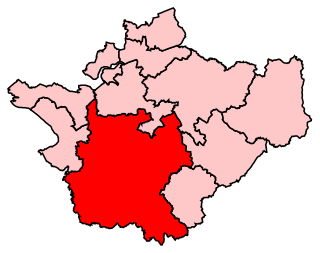
Eddisbury is a constituency in Cheshire represented in the House of Commons of the UK Parliament since 2019 by Edward Timpson, a Conservative.
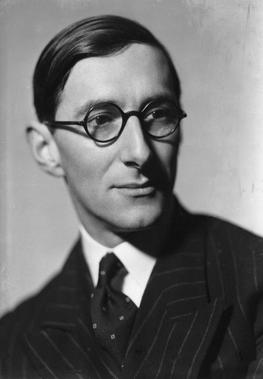
Sir Richard Thomas Dyke Acland, 15th Baronet was one of the founding members of the British Common Wealth Party in 1942, having previously been a Liberal Member of Parliament (MP). He joined the Labour Party in 1945 and was later a Labour MP. He was one of the founders of the Campaign for Nuclear Disarmament (CND).
The 1943 Darwen by-election was a by-election held on 15 December 1943 for the British House of Commons constituency of Darwen in Lancashire.

The 1943 Chippenham by-election was a parliamentary by-election held in England on 24 August 1943 for the British House of Commons constituency of Chippenham in Wiltshire.
The 1938 Bridgwater by-election was a parliamentary by-election for the British House of Commons constituency of Bridgwater, Somerset held on 17 November 1938.

Anthony Edward Timpson, is a British politician who was elected as the Member of Parliament (MP) for Eddisbury in Cheshire at the 2019 general election. He is a member of the Conservative Party.
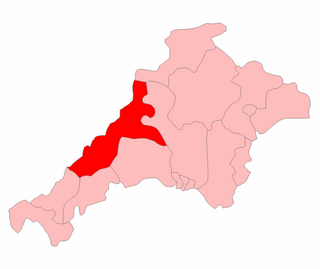
The 1932 North Cornwall by-election was a parliamentary by-election held on 22 July 1932 for the British House of Commons constituency of North Cornwall.

John Frederick Loverseed was a British Liberal politician.
The 1929 Eddisbury by-election was a by-election held on 20 March 1929 for the British House of Commons constituency of Eddisbury.

Richard John Russell was a British dental surgeon and Liberal later Liberal National politician.
John Eric Loverseed was a pilot who flew with the Royal Air Force in 1930s, with Republican forces in the Spanish Civil War in 1937/38, and with the RAF again during the Battle of Britain. In 1943 he was elected as a wartime MP for the Common Wealth Party. He was later a co-founder of the pacifist Fellowship Party.
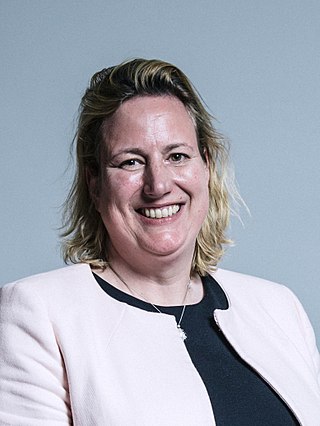
Antoinette Geraldine Mackeson-Sandbach, known as Antoinette Sandbach, is a barrister, farm manager and politician who was elected as a North Wales region Member of the Welsh Assembly at the May 2011 election, and subsequently elected Member of Parliament for Eddisbury in Cheshire at the 2015 general election.
The 1911 Oldham by-election was a Parliamentary by-election held on 13 November 1911. The constituency returned two Members of Parliament (MP) to the House of Commons of the United Kingdom, elected by the first past the post voting system.

The 1944 Bury St Edmunds by-election was a parliamentary by-election for the British House of Commons constituency of Bury St Edmunds, Suffolk on 29 February 1944.
Harold Heathcote Williams QC, was a British Liberal Party politician and barrister.
The 1944 Skipton by-election was a parliamentary by-election for the British House of Commons constituency of Skipton, Yorkshire held on 7 January 1944.
The Popular Front in the United Kingdom attempted an alliance between political parties and individuals of the left and centre-left in the late 1930s to come together to challenge the appeasement policies of the National Government led by Neville Chamberlain.
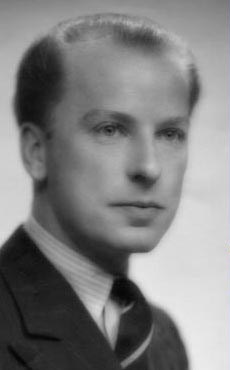
Comdr. Dunstan Michael Carr Curtis CBE, was a British lawyer, civil servant and Liberal Party politician.